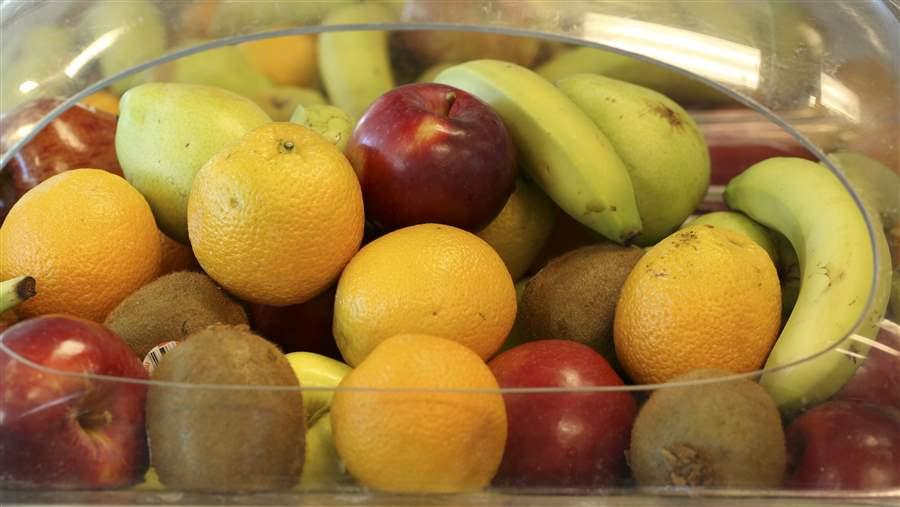Nutrition Education Is a Core Component of School’s Curriculum
Eunice C. Williams is the principal of Brockman Elementary School in Columbia, South Carolina, which received national recognition from the Alliance for a Healthier Generation in 2015 for nutrition and physical activity improvements. The Kids’ Safe and Healthful Foods Project spoke with Williams about her school’s efforts to support healthy eating and active lives.
 The Pew Charitable Trusts
The Pew Charitable TrustsBrockman Elementary School teaches the benefits of fresh fruits and other healthful foods in the classroom, the cafeteria, and the campus gardens.
Q: How does Brockman integrate nutrition education throughout the school?
A: Healthy eating is either a way of life or it is not. We don’t want our children to grow up thinking that taking care of your health is something they should do only when it’s convenient. In the classroom, in the greenhouse, and outside in our garden plots, we have a clear focus on teaching healthy food choices and good nutrition. We’re proud of our gardening efforts, in which the students learn how to grow healthy foods and prepare meals with food they nurtured from seed.
This focus on healthy foods continues from the classroom to the cafeteria, where students are served nutritious lunches and make their own healthy choices at our school salad bar. Teachers demonstrate the joy of eating freshly grown vegetables and encourage them to try fresh foods.
Q: What kind of hands-on experience do you include for students as part of their nutrition education?
A: Our children are involved in the preparation of their snacks and, as I mentioned, of food from the school garden. Knowing how to cut, clean, and present different foods is a practical life skill that children will need in order to grow into healthy, independent adults. It goes beyond kitchen tools, too. We believe our children need to know how to properly use utensils at a meal. Through support from our parent-teacher organizations, we were able to purchase real silverware, place settings, and cloth napkins to help every child in our school practice good table manners daily in the cafeteria. These are all tools that students need in order to learn about and practice healthy habits, and we are very pleased with their interest in these topics!
Q: How is healthfulness ingrained in your school’s educational philosophy?
A: At Brockman, you see this interconnectedness as our children learn about their personal health and study health issues in our world. Kids are health conscious when they select snacks for their classrooms, make menu selections at lunch, work in the garden, or choose to be physically active at recess. For the past two years, we’ve also made sure that we are sending a consistent message to our students through all school-led efforts, such as fundraising. We swapped out all activities that required selling items—whether food or not—for one major annual fundraiser, our FUNd Run, in which every student ran or walked for 20 minutes to help raise money for the school. This allows staff, students, and parents to have a special two-week focus on eating healthy foods and being more physically fit while preparing for the activity-based fundraiser.
Q: Have you noticed an improvement in the students’ academic performance as they learn more about healthy eating?
A: You definitely see the health benefits of good eating, including a greater ability to focus and learn. You also see children more excited about making healthier choices and being eager to do the right things for their bodies. You don’t want children making these choices because the adult wants them to. You want them to make the right choices because it’s what the child wants to do. That’s exciting to us as teachers, because we know these are lessons that will help them throughout their lives.
Q: Why do you think it is so important to educate kids on this subject?
A: I believe in the power of prevention over interventional change. This is why I believe so strongly in the work we do with our children here at Brockman. It’s our chance to help them develop healthy habits for all of their life. My hope is that they can fulfill all of their dreams. Positive health habits and behaviors put them one step closer to realizing those dreams.






